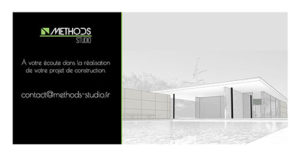 Obtaining financing for real estate is often a headache when you don't know how to go about it.
Obtaining financing for real estate is often a headache when you don't know how to go about it.
First-time buyers, moving their main residence or real estate investment, the financing methods differ and adapt to the situation. Your architectural and builder agency Methods Studio Architectors takes stock with the mortgage expert Borrow the agency, on the various mortgage loans existing on the French market to date.
A real estate loan VS buying capacity: understanding the amount you are borrowing
A mortgage goes hand in hand with buying power, but what is it? Here are some key definitions to give you an overall understanding of the subject:
A mortgage is the amount that the bank agrees to lend you, and that you will have to repay monthly over a number of years.
Buying capacity is defined as the maximum amount of goods that you can buy on the real estate market.
With a property purchase come notary fees; this is the amount you will have to pay to the notary, or lawyer, who will handle your purchase. The amount varies depending on the nature of the property (new, old, etc.).
Finally, loan insurance. This is a guarantee that will recover the repayment of your mortgage if you find yourself unable to do so yourself. Note that the Lagarde law of July 2, 2010 authorizes the borrower to shop around for credit insurance contracts. You are therefore entitled to subscribe to a contract chosen by your and approved by the bank. This can save on the cost of insurance.
 And since February 8, 2017, this credit insurance competition law applies throughout the duration of the mortgage. However, check with the bank when taking out your loan, because not all banks will allow you to take out anything other than their own insurance.
And since February 8, 2017, this credit insurance competition law applies throughout the duration of the mortgage. However, check with the bank when taking out your loan, because not all banks will allow you to take out anything other than their own insurance.
When we decide to purchase real estate, we have to take out a mortgage. But how do you know how much to borrow?
How can you work out how much you will need to borrow? We’ll try to explain with a concrete case.
Say you want to buy a first property for €500,000. You will need €500,000 plus notary, or “legal” fees (average legal fees are estimated at 8% of the purchase price for an old house so €40,000 in our example).
In total, you will need at least €540,000, to which you will have to add brokerage fees, agency fees, and other fees related to your loan.
You have savings of €50,000 you can use as a deposit. The amount you will seek to borrow will therefore be €490,000.
Or, to look at it from a different angle, if the maximum loan that you can obtain is €490,000 and you have a deposit of €50,000, your buying capacity is €500,000, so you can buy anything on the market up to a value of €500,000.
Price of property + Legal fees = Deposit + Financing (mortgage)
In any case, before you embark on buying a property, whether a new house or an old one, or even collective housing, you should work out how much you will need to borrow. It is this amount that we will seek to finance through the various solutions presented in this article.
Like buying a house or an apartment you may have to look around before finding your favorite. As part of a home loan, whether it's a first purchase or you have already bought real estate before, seek advice from various banks or approach an expert in the field. This is not a choice to be made on a whim, but carefully thought through in order to obtain the best possible loan terms.
First-time buyers: financing your first property
If you are buying your first property and it will be your main residence, you have the possibility of taking out several types of loans. The parameters taken into account for obtaining a mortgage are: your monthly income, your deposit, and especially your borrowing capacity (33% of your maximum income). Contact several providers (banks, expert agencies, or even a broker) and compare! This could enable you to make big savings in the long term.
The advantage of hiring an expert when you are a first-time buyer, in other words, purchasing your first property, is that you will obtain the best advice for financing your project.In particular the expert will facilitate the procedures, ensure you get the best interest rate, and help you avoid administrative fees, etc.
Here are some of the possible loans when buying your primary residence:
The Free Loan:
It is the most widespread, is open to all, and is not subject to government regulations.There are many products out there, which may confuse you. Do not hesitate to seek professional help.
The Social Accession Loan (PAS)
If you are on a modest income, this loan may be for you. The PAS is means tested so you will need to have your situation analyzed by a bank approved by the state.
 The Agreement Loan (PC)
The Agreement Loan (PC)
This loan applies if you are not putting down a deposit on your house. It finances 100% of the cost of your purchase; however the property must be your main residence or that of a relative. The agreement loan is not subject to a means test.
The Zero Rate Loan (PTZ)
There are many restrictions on who can get this highly advantageous loan. One of these is that you must not have been an owner for at least two years. If you qualify for it, this is very interesting loan.
The Housing Action Loan (formerly known as the 1% employer loan)
It is aimed at employees in the private sector. Inquire with your company to find out how to benefit from this loan at the regulated rate of 1% (exactly, at the fixed rate equal to that of the livret A in force on 31 December of year n-1, with a floor rate of 1 %)
The Mortgage Loan
Lastly, if you're having trouble getting a loan, try a mortgage. It is generally obtained quite easily because the risk is limited for the bank. With a mortgage, the property you buy will, in reality, only be yours once you have paid off the entire amount borrowed. Until then, it belongs to the bank.
What to do when applying for a loan: here are some tips to follow
The first time you buy a property can be a source of anxiety. Here is some advice from our mortgage expert to help you with your interview with a bank:
- Reassure your banker about your repayment capacity ;
- Make sure you are not overdrawn when you apply for a loan, or for a few months beforehand if possible;
- Pay off any outstanding consumer loans before applying to borrow money;
- Your application will be more likely to succeed if you can show you have a deposit as this demonstrates your ability to save;
- Highlight your prospects for career advancement and any additional income - anything that may encourage the bank to agree to your first mortgage.
Financing a change of primary residence
When you change your main residence, you generally need the income from the sale of your current home to finance your new one. But it is difficult to sell the first until you are sure you have bought the second! In this case, a specific loan exists: the Bridging Loan.
This makes it possible to buy your new housing before you have actually sold the old one. Interest rates on bridging loans are often low.
Finance a secondary real estate project
What if you already have a main home, and you want to acquire additional properties to rent out or as a second home? Credit terms, especially interest rates, do not vary for the purchase of a primary or secondary residence. On the other hand your borrowing capacity does decrease if you already have a mortgage.
It will therefore first be necessary to take stock of your savings; a personal contribution will help your mortgage application.When buying a first property, the bank adviser will appreciate an amount that at least matches the legal fees.
You will then need to compare the offers of the banks and negotiate the rate, the administration fees, the guarantee, and of course the credit term for either a main residence or a buy-to-let property.As an example, a depreciable mortgage will cover all costs (construction, work, but also legal fees, the purchase price, and costs related to the loan).
Calculate your buying capacity for a second mortgage
To work out your buying capacity, you will first need to calculate the size of your deposit.Then you need to add up all fees and various credits for which you are already liable.The total sum must be less than 33% of the household's net income. Depending on your profile, but very occasionally, it could be as much as 40%.
You can also use an equity release mortgage.This means a mortgage taken out against your main residence. With this, the bank loan is guaranteed by one or more properties which the borrower owns. So you would take out this mortgage if you own a property and want to obtain liquidity without having to sell it. This makes it possible to start a new loan, and the main residence serves as collateral for the secondary purchase.
The world of bank loans for real estate is full of offers and possibilities. You can find everything, at all prices. We therefore strongly advise you to take the time to compare, ask for information, check the loan conditions, and above all take advice from professionals in the sector.
 Stay the course, you’ll be home soon!
Stay the course, you’ll be home soon!
This article was co-authored with the mortgage expert, Empruntis l’agence. Our architect and building firm works with the best experts in Ile-de-France for all your construction or renovation projects.

The Methods Studio Architectors team
Only when you are satisfied is our job done
follow us on LinkedIn
https://www.methods-studio.fr
Contact our architect-builders: contact@methods-studio.fr




